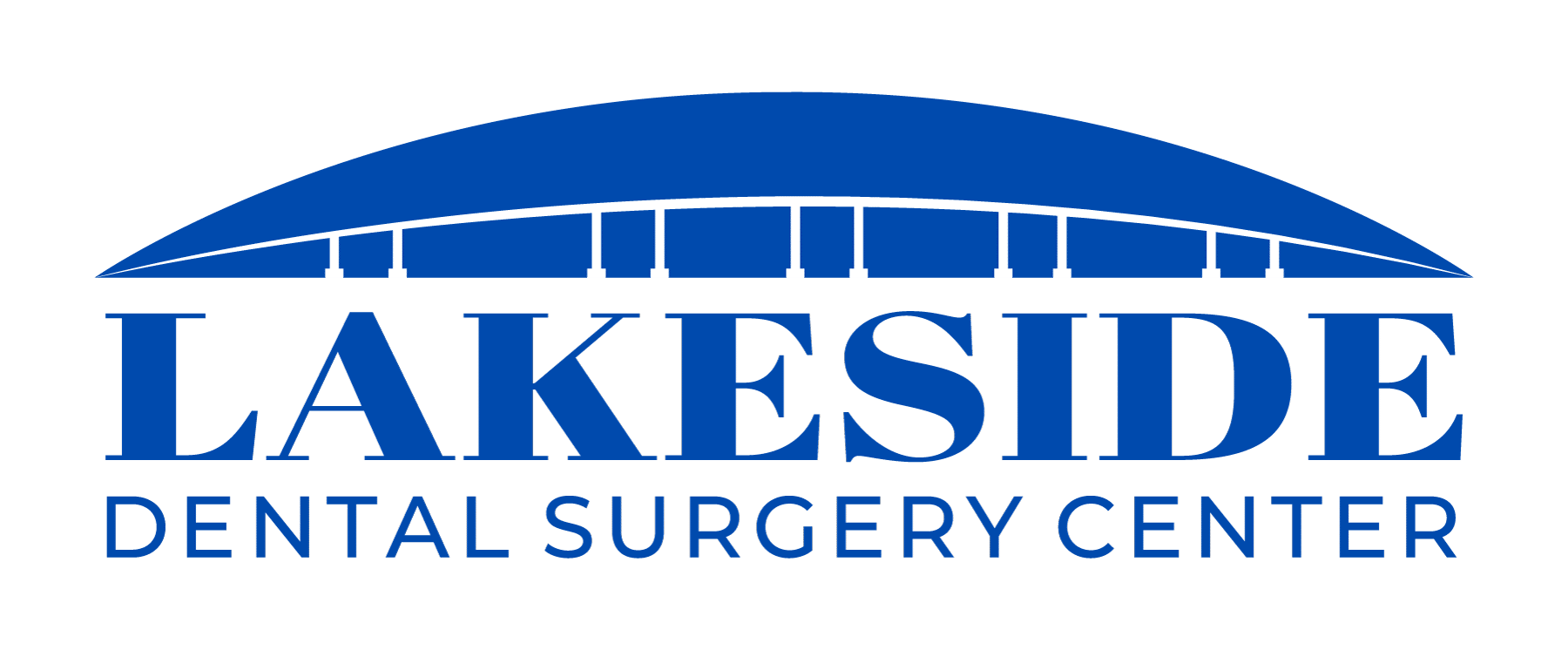FAQs
Frequently Asked Questions
Ambulatory Surgery Centers (ASC) are designed to provide safe and efficient dental care in a comfortable and supportive environment. ASCs are medical outpatient facilities designed to provide surgical services to patients with a singular focus on patient safety.
At Lakeside Dental Surgery Center, we have a team of healthcare professionals who are specially trained to care for our dental patients. That care team is made up of anesthesiologists, CRNAs (Certified Registered Nurse Anesthetists), AAs, RNs, and other support staff. Our facility is equipped with pleasant waiting areas and recovery rooms to help make the experience as stress-free as possible for our patients and their families.
Yes! Lakeside Dental Surgery Center has an open credentialing process that allows any dental specialist to gain privileges at the facility to treat their patients…you! To see our credentialed providers, click here.
If you don’t see your dentist listed, let us know, and we’ll invite them to be a part of Lakeside Dental Surgery Center. Contact us!
If you do not have a dentist and believe you or your child needs to have their dental treatment completed at Lakeside Dental Surgery Center, click here!
Lakeside Dental Surgery Center was created to provide patients access to dental sedation who otherwise are unable to receive this care. Patients with special healthcare needs and their caregivers often struggle to find both a place for the patient to receive sedation and a dentist able to do so. Our facility is specially designed to provide safe anesthesia services to many patients with special healthcare needs, including developmental delays. If you are facing this struggle right now with your loved one, please ask your dentist to provide dental care at Lakeside Dental Surgery Center.
Lakeside Dental Surgery Center is in the process of credentialing with every major medical insurance provider, including Tricare and Medicaid. Our facility is a medical facility, which means your family is able to use its medical insurance for the anesthesia services, provided by the anesthesiologist, and the facility fees associated with the care the patient receives. As our medical insurance payer list grows, you can find Lakeside Dental Surgery Center’s in-network insurance companies here.
The dental treatment is subject to the dental network participation of your dentist, and claims will be processed from their dental office after treatment, as usual.
A consultation allows the surgeon to evaluate your child’s oral health and medical history and discuss the details of the proposed procedure with you and your child. Here are some reasons why a consultation is necessary:
- Evaluation of oral health: The dental surgeon will evaluate your child’s oral health to determine the best course of treatment for their specific needs. This may include a dental exam, X-rays, and other diagnostic tests.
- Discussion of medical history: The dental surgeon will review your child’s medical history to ensure that they are healthy enough to undergo the proposed procedure. This includes a review of any medical conditions, allergies, or medications your child may be taking.
- Discussion of procedure details: The dental surgeon will explain the details of the proposed procedure to you and your child, including what to expect before, during, and after the procedure. This will allow you to ask questions and address any concerns you may have.
- Development of a treatment plan: Based on the evaluation of your child’s oral health and medical history, the dental surgeon will develop a customized treatment plan that is tailored to your child’s specific needs.
- Discussion of risks and benefits: The dental surgeon will discuss the risks and benefits of the proposed procedure and any alternative treatment options available. This will help you make an informed decision about whether to proceed with the procedure.
- Overall, a consultation with a dental surgeon is an important step in ensuring the best possible outcome for your child’s dental procedure. It allows the surgeon to evaluate your child’s oral health and medical history, discuss the details of the proposed procedure, and develop a customized treatment plan that is tailored to your child’s specific needs.
Your first point of contact with Lakeside Dental Surgery Center will be your patient navigator. This person will assist your family through the entire process, from scheduling, to coordination of insurance benefits and financial questions, to the pre-op process all up until the day of the procedure. You are encouraged to e-mail or call your navigator any time you have questions.
If you have any questions about your family members dental treatment before the procedure you are asked to call your dental provider’s office directly to address those questions.
On the day of the procedure, the nursing and anesthesia team and your dental care team will be available for all same-day questions and concerns.
In the days or weeks following treatment, your dental provider will schedule a follow-up appointment at their office or will be available for any questions or concerns.
All patients need to schedule a visit with their dental provider before scheduling with Lakeside Dental Surgery Center. Many insurance companies will require the dentist to submit authorization with the dental insurance before scheduling the patient at Lakeside Dental Surgery Center.
Once the patient has been evaluated by the dentist and referred to Lakeside Dental Surgery Center, our patient navigators will contact your family to secure a procedure date as soon as possible.
Before a dental procedure, the medical care team will likely require your child not to eat or drink for a certain amount of time. This is because eating or drinking before a procedure can sometimes make them feel sick and throw up. If they throw up while they are sleeping during the procedure, the food or liquid can go down into their lungs and make them sick. To keep them safe, the care team will ask you to ensure that your child does not eat or drink anything for a certain amount of time before the procedure. It is very important to follow these instructions to make sure they are safe and healthy during the procedure. In most cases, a failure to follow these pre-op instructions will result in the cancelling and postponement of the procedure. If you have any questions, please contact your patient navigator to explain in more detail.
Ordinarily, as it relates to anesthesia being performed, it is anticipated that your child will be able to resume normal activities the day after his or her treatment. The ability to resume all normal diet and physical activities will depend on what type of dental/oral surgery treatment your child is having completed. We recommend asking and following your dentist’s post-operative instructions as it related to when your child can resume normal activities.
After completing your child’s anesthesia, they will be able to drink clear liquids and gradually increase to soft foods and normal diet. As it relates to the anesthesia your child will receive, there are typically no diet restrictions. Any diet restrictions will come from your child’s dentist depending on the type of treatment completed. We encourage our patients and families to follow your dentist’s post-operative instructions.
- The length of time a dental procedure takes in an Ambulatory Surgery Center (ASC) can vary depending on several factors. These factors include the type and complexity of the dental procedure, the patient’s overall health and medical history, and the surgeon’s experience and skill level. Procedures such as dental fillings, dental crowns, or simple extractions can take anywhere from a few minutes to a couple of hours to complete. The duration of the procedure is related to amount of treatment and type of treatment needed. More complex dental procedures such as multiple extractions, multiple dental restorations, jaw reconstruction, or placement of dental implants can take several hours. We aim to provide timely and efficient care to our patients, so they can return home as soon as possible after their procedure. Our team will schedule procedures so that they can use time efficiently while providing the necessary care to the patient.
- It is important to note that the length of a procedure is a general estimate, and the actual time required for a specific dental procedure can vary based on individual circumstances. Our team can provide you with a more accurate estimate of how long your specific procedure is expected to take. They can also provide you with information about what to expect during your recovery period, and how to care for your teeth and mouth after the procedure.
It is not anticipated that your child will be numb following his or her dental treatment. Routine dental treatment completed in an ASC does not require local anesthesia. However, depending on the procedure being completed, your child may have received local anesthesia at your dentist’s discretion.

